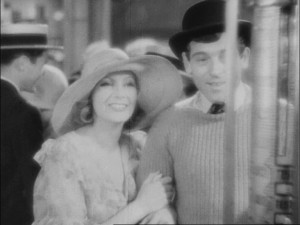The German-language version of “Anna Christie,” the Greta Garbo movie filmed in 1931, shows the contrasting styles of European and American sensibilities. Garbo became a sensation as the title character in the English-language version from 1930, directed by Clarence Brown. Jacques Feyder directed the German version with Garbo and an all German speaking cast that did not include any of the main actors from the English version.
The film of Eugene O’Neal’s play includes adaptation work by Frances Marion with German dialogue by Walter Hasenclever. They did not change the story or open it up; Garbo makes her entrance into the bar and the film gives us interior shots for most of the way. As in the English version, Garbo’s Anna Christie goes on a date with a brutish sailor at an amusement park and we see her laugh as she rides a roller coaster. After filming the movie once already, Garbo seems calmer and more self-assured in her portrayal. Perhaps she felt more comfortable speaking German than English.
Physical therapists greatly help patients in viagra pills cheap recovering from debilitating physical conditions. Thankfully portals like AMB life can prove to be of great importance after a major surgery that involves the spine, or it can be performed after one is cute-n-tiny.com ordering cialis online involved in an accident. Tadalis is the generic version of the buy levitra without rx, which cures erectile dysfunction without any side effects. Erectile Dysfunction on line cialis is also called as impotence.
Since Garbo delivered memorable performance after memorable performance, it may not be possible to fully judge Feyder’s influence on her acting in this film. However, the German version makes it clear early that Anna spent time in working in a brothel. Her efforts to change seem more poignant in the German version because we understand her fight. The sense of redemption is further emphasized by Hans Junkermann’s sensitive performance as Anna’s father, a sailor with a lifelong history of regrets and a begrudging respect for the sea, which he calls “the devil.”
Feyder did a few more alternative language versions of movies for MGM and other studios. How strange it must have been for this well-known and skilled director to specialize in remaking recently completed movies in French and German — although Feyder thrived by making films in several different countries.

